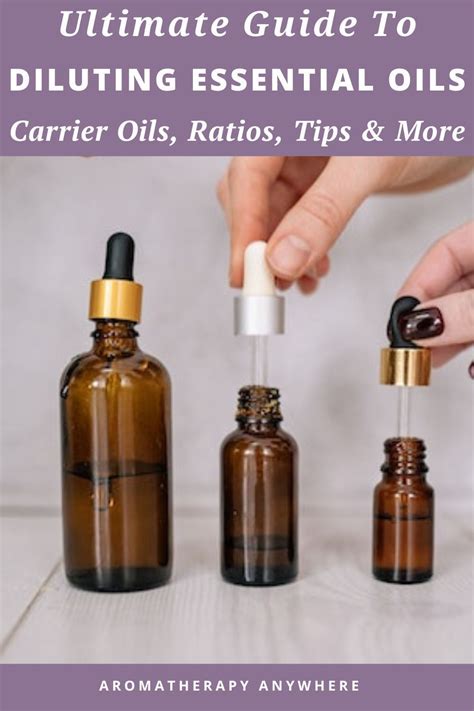Essential oils are highly concentrated plant extracts with potent therapeutic properties. However, their intense nature requires dilution before applying them to the skin or taking them internally. This is where carrier oils come into play.

What are Carrier Oils?
Carrier oils are vegetable-based oils that serve as a medium for diluting essential oils. They help disperse the essential oils evenly, allowing for safe and effective application. Carrier oils also nourish the skin and enhance the absorption of essential oils.
Popular Carrier Oils
Numerous carrier oils offer unique benefits. Here are some of the most commonly used:
- Jojoba Oil: A liquid wax that closely resembles the skin’s natural sebum. It is non-comedogenic (won’t clog pores) and has moisturizing properties.
- Sweet Almond Oil: A light and easily absorbed oil that is rich in vitamins A, D, and E. It is suitable for all skin types.
- Fractionated Coconut Oil: A refined coconut oil that remains liquid at room temperature. It is non-greasy and provides a silky smooth feel.
- Grapeseed Oil: A light and non-comedogenic oil that is rich in antioxidants. It is ideal for oily or acne-prone skin.
- Avocado Oil: A thick and creamy oil that is rich in vitamins A, D, and E. It is deeply moisturizing and nourishing.
Choosing the Right Carrier Oil
The choice of carrier oil depends on your skin type, desired results, and the essential oils you are using. Consider the following factors:
- Skin Type: Dry skin requires richer oils like avocado oil, while oily skin benefits from lighter oils like grapeseed oil.
- Essential Oil Properties: Some essential oils, like peppermint, can be more irritating and require a higher dilution ratio. Choose a carrier oil that complements the properties of your essential oils.
- Personal Preferences: Ultimately, the best carrier oil for you is the one that you find most comfortable to use.
Dilution Ratios
The appropriate dilution ratio for essential oils varies depending on the oil’s potency, intended use, and individual sensitivity. Here are some general guidelines:
| Dilution Ratio | Essential Oil Type | Intended Use |
|---|---|---|
| 1:100 | Highly concentrated | Diffusing in air |
| 1:25 | Moderately concentrated | Topical application for adults |
| 1:12 | Diluted | Topical application for children |
| 1:6 | Strong | Spot treatment for specific ailments |
Dilution Guide
To prepare an essential oil dilution, follow these steps:
- Determine the desired dilution ratio (e.g., 1:25).
- Calculate the amount of carrier oil needed (e.g., for a 1:25 ratio, divide the number of drops of essential oil by 25).
- Add the carrier oil to a glass bottle or rollerball.
- Add the essential oil and shake well to combine.
Benefits of Using Carrier Oils
Incorporating carrier oils into your essential oil routine offers numerous advantages:
- Safe Application: Carrier oils dilute essential oils, making them gentler on the skin and reducing the risk of irritation.
- Enhanced Absorption: Carrier oils help essential oils penetrate the skin better, increasing their therapeutic effects.
- Nourished Skin: Carrier oils provide essential nutrients and moisture to the skin, leaving it feeling soft and smooth.
- Extended Shelf Life: Carrier oils can help preserve the volatile compounds in essential oils, extending their shelf life.
Applications of Carrier Oils
Carrier oils enhance the versatility of essential oils, making them suitable for various applications:
- Aromatherapy: Dilute essential oils in a carrier oil and diffuse them in the air using an essential oil diffuser.
- Topical Application: Dilute essential oils in a carrier oil and apply them directly to the skin for therapeutic benefits.
- Massage: Add essential oils to a carrier oil and use it for a soothing massage.
- Bath: Add a few drops of diluted essential oils to your bathwater for a relaxing and aromatic experience.
- Hair Care: Dilute essential oils in a carrier oil and apply them to the hair and scalp for nourishment and shine.
Carrier Oil Table
| Carrier Oil | Botanical Name | Skin Type | Properties |
|---|---|---|---|
| Jojoba Oil | Simmondsia chinensis | All | Non-comedogenic, moisturizing |
| Sweet Almond Oil | Prunus amygdalus dulcis | All | Light, easily absorbed, rich in vitamins |
| Fractionated Coconut Oil | Cocos nucifera | All | Non-greasy, silky smooth |
| Grapeseed Oil | Vitis vinifera | Oily, acne-prone | Light, non-comedogenic, antioxidant-rich |
| Avocado Oil | Persea americana | Dry, mature | Thick, creamy, deeply moisturizing |
Dilution Ratio Table
| Dilution Ratio | Essential Oil Type | Intended Use |
|---|---|---|
| 1:100 | Highly concentrated | Diffusing in air |
| 1:25 | Moderately concentrated | Topical application for adults |
| 1:12 | Diluted | Topical application for children |
| 1:6 | Strong | Spot treatment for specific ailments |
Pros and Cons of Carrier Oils
Pros:
- Dilute essential oils for safe and effective application
- Enhance absorption of essential oils into the skin
- Nourish and protect the skin
- Extend the shelf life of essential oils
- Increase the versatility of essential oils for various applications
Cons:
- Some carrier oils may be comedogenic (clog pores)
- Carrier oils can dilute the potency of essential oils
- Some carrier oils may have a strong odor
Conclusion
Carrier oils play a vital role in the safe and effective use of essential oils. By understanding the different types of carrier oils, choosing the right one for your needs, and following dilution guidelines, you can unlock the full potential of your essential oils while ensuring their optimal application and benefits. Remember, always consult with a qualified healthcare professional before using essential oils.
